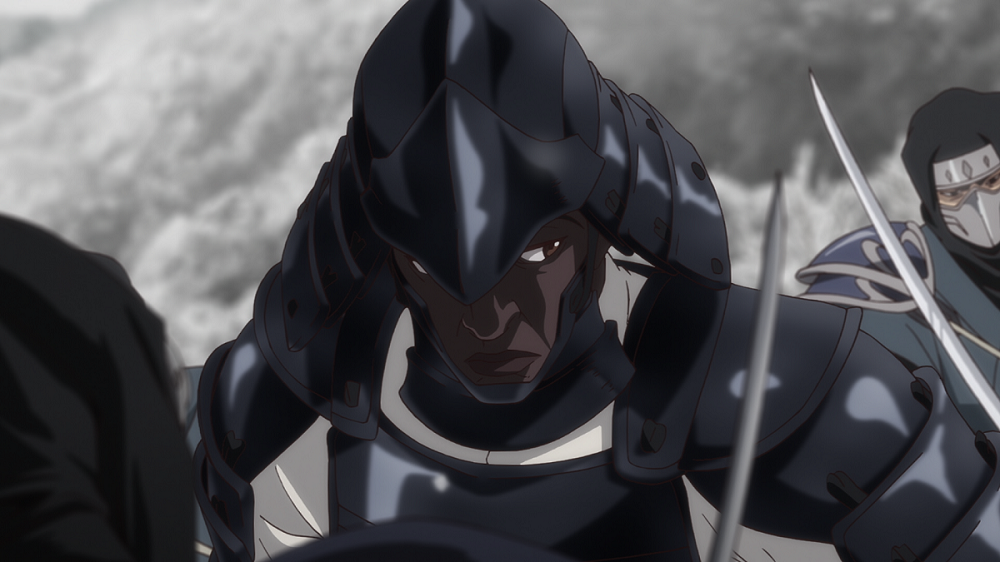In 1579, a Black slave arrived in Japan with an Italian Jesuit missionary. Awestruck by his black skin, daimyō Oda Nobunaga, a Japanese feudal lord, acquired him as a servant under the belief ink covered his body. The two formed a quick bond, and Nobunaga bestowed the name “Yasuke” to him. Yasuke rose from servant to nobleman to samurai. Through a series of gruesome campaigns, which witnessed untold slaughter, Nobunaga worked to unite Japan. The 6’ 2” Yasuke accompanied Nobunaga on his travels, but following the feudal lord’s suicide, a death precipitated by a coup, Yasuke disappeared from the history books.
Yasuke’s legend has of course been featured on screen before: The anime “Afro Samurai” pays tribute to him and before he passed, Chadwick Boseman was slated to play him in a live-action film. But director LeSean Thomas (“The Boondocks” and “Black Dynamite”) uses the legend as a different entry point into his six-episode Netflix animated series ”Yasuke.” A fever-dream of historical-fiction, the brutal show combines powerful mysticism, demonic mutants, exploding robots and familiar but sharp swordplay for a trippy story of regret and tradition.

In Thomas’ brisk adaptation, a broken Yasuke (voiced by Lakeith Stanfield) calls a quiet small stream-side village his home. A disheveled beard and dreads, and an always filled bottle of sake color his character. He follows the familiar trope of the once proud warrior turned drunken loner. 20 years earlier he assisted his master Nobunaga with his suicide, and the pain has never left him. Though Nobunaga (Takehiro Hira) respected Yasuke, his older generals did not. Racism masquerading as ritual dominated their perceptions of him. And away from the court, decades later in this tiny village, Yasuke feels like a bigger outsider than before.
His quiet corner is disturbed when a local singer, Ichika (Gwendoline Yeo), asks the now boatsman to shepherd her sick daughter, Saki (Maya Tanida), upstream to a doctor. Unbeknownst to Yasuke, the girl possesses immense psychic powers, making her the target of a fantastical evil witch.
Akin to Flying Lotus’ chill vaporwave score, the story of “Yasuke” emotionally wafts and thrums at different intervals. For every step our hero takes from his hideaway village, an object like a lotus necklace triggers his haunted memory back to his days under Nobunaga. That’s where he met a fellow outsider in the feudal lord’s court, the equally skilled female fighter Natsumaru (Ming-Na Wen). And that’s where their presence, a change from the older homogenous samurai tradition, caused the establishment to recoil. It’s a nice subversion. Often when Japan’s way of life is depicted as threatened, whether in film or television, it’s due to outside forces trying to westernize the country. But this is an African and Asian woman who are desperately trying to drag this feudal land into the future. And no matter how often they prove their worth, they’re perpetually othered.
When “Yasuke” is looking backwards toward its protagonist’s regrets, it’s infusing genre-bending elements—sci-fi, Blacksploitation, Western, and fantasy—that similarly work against tradition. Thomas fills the series with a villainous shapeshifting bear, a quirky futuristic mech, an African witch doctor, and other mystical beings. A torturous Jesuit priest, bordering on the grotesque, acts as an ode to Catholicism’s aims of converting the Japanese during the 16th century. Sika travels to a vibrant tripped out Astral Plane. And dark hallucinogenic magic pervades.

Thomas’ show can often create whiplash through these sharp tonal and visual shifts: at points we see classic samurai duels and technologically advanced cannon blasts in the same frame. The story also makes little sense and feels convoluted. And there are too many minor monsters hunting Yasuke and company for any of them to make a discernible impact. But, oh, the bloody swordplay is consistently enthralling. Pinkish purple vistas of Japan’s landscape, animated to startling clarity, serve as the backdrop to Yasuke’s gushing slaughters. With eye-popping fluidly, he cuts down his opponents in the breadth of a single slash, causing their insides to explode across the screen.
The decapitations are plentiful; the exposing of guts heaps even greater rewards. The large set pieces, which sees vast armies descending upon our heroes, who are holed up in a fortified stronghold, brings reminders of “The Lord of the Rings: The Return of the King.” An ending tear-jerking epilogue harks to “The Last Samurai.” Throughout it all, Stanfield’s laid-back voice oscillates between weary and fiery, holding the wide emotional swings of this latest MAPPA studio (“Attack on Titan” and “Banana Fish”) creation together.
To the tune of six brisk half-hour length episodes, Thomas’ “Yasuke” hits the spot for any anime lover while offering new subversions to the samurai genre. It raises questions regarding racism and sexism. And it never shies away from real ruthlessness. While the story features a few too many dots that need connecting, “Yasuke” connects in every other way for maximum bloody impact.
All six episodes screened for review. “Yasuke” premieres on Netflix on April 29.












